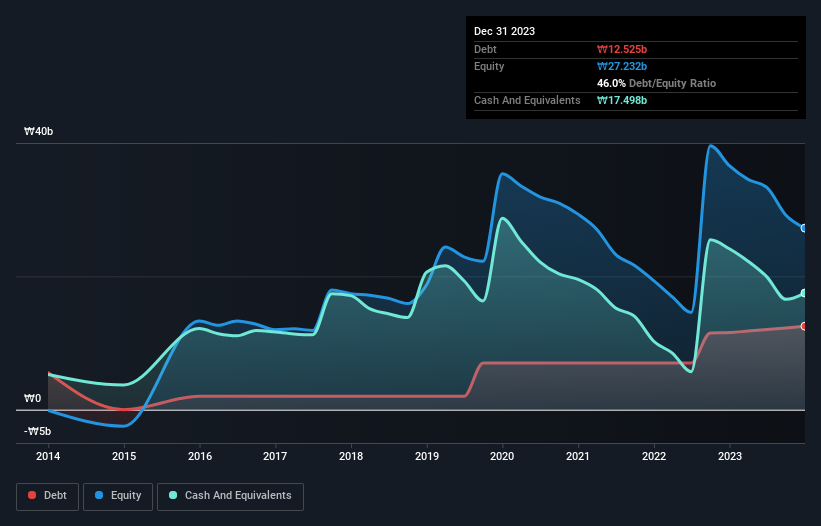
Warren Buffett famously said, 'Volatility is far from synonymous with risk.' When we think about how risky a company is, we always like to look at its use of debt, since debt overload can lead to ruin. We note that AbClon Inc. (KOSDAQ:174900) does have debt on its balance sheet. But the more important question is: how much risk is that debt creating?
When Is Debt Dangerous?
Debt assists a business until the business has trouble paying it off, either with new capital or with free cash flow. In the worst case scenario, a company can go bankrupt if it cannot pay its creditors. While that is not too common, we often do see indebted companies permanently diluting shareholders because lenders force them to raise capital at a distressed price. Of course, plenty of companies use debt to fund growth, without any negative consequences. When we think about a company's use of debt, we first look at cash and debt together.
See our latest analysis for AbClon
What Is AbClon's Debt?
As you can see below, at the end of December 2023, AbClon had ₩12.5b of debt, up from ₩11.6b a year ago. Click the image for more detail. But on the other hand it also has ₩17.5b in cash, leading to a ₩4.97b net cash position.

How Strong Is AbClon's Balance Sheet?
According to the last reported balance sheet, AbClon had liabilities of ₩17.6b due within 12 months, and liabilities of ₩589.9m due beyond 12 months. On the other hand, it had cash of ₩17.5b and ₩82.3m worth of receivables due within a year. So it has liabilities totalling ₩606.6m more than its cash and near-term receivables, combined.
Having regard to AbClon's size, it seems that its liquid assets are well balanced with its total liabilities. So it's very unlikely that the ₩274.1b company is short on cash, but still worth keeping an eye on the balance sheet. While it does have liabilities worth noting, AbClon also has more cash than debt, so we're pretty confident it can manage its debt safely. When analysing debt levels, the balance sheet is the obvious place to start. But it is AbClon's earnings that will influence how the balance sheet holds up in the future. So when considering debt, it's definitely worth looking at the earnings trend. Click here for an interactive snapshot.
In the last year AbClon had a loss before interest and tax, and actually shrunk its revenue by 9.5%, to ₩3.1b. That's not what we would hope to see.
So How Risky Is AbClon?
By their very nature companies that are losing money are more risky than those with a long history of profitability. And in the last year AbClon had an earnings before interest and tax (EBIT) loss, truth be told. And over the same period it saw negative free cash outflow of ₩9.5b and booked a ₩13b accounting loss. However, it has net cash of ₩4.97b, so it has a bit of time before it will need more capital. Summing up, we're a little skeptical of this one, as it seems fairly risky in the absence of free cashflow. When analysing debt levels, the balance sheet is the obvious place to start. However, not all investment risk resides within the balance sheet - far from it. For example AbClon has 4 warning signs (and 1 which is a bit concerning) we think you should know about.
At the end of the day, it's often better to focus on companies that are free from net debt. You can access our special list of such companies (all with a track record of profit growth). It's free.
If you're looking to trade AbClon, open an account with the lowest-cost platform trusted by professionals, Interactive Brokers.
With clients in over 200 countries and territories, and access to 160 markets, IBKR lets you trade stocks, options, futures, forex, bonds and funds from a single integrated account.
Enjoy no hidden fees, no account minimums, and FX conversion rates as low as 0.03%, far better than what most brokers offer.
Sponsored ContentNew: Manage All Your Stock Portfolios in One Place
We've created the ultimate portfolio companion for stock investors, and it's free.
• Connect an unlimited number of Portfolios and see your total in one currency
• Be alerted to new Warning Signs or Risks via email or mobile
• Track the Fair Value of your stocks
Have feedback on this article? Concerned about the content? Get in touch with us directly. Alternatively, email editorial-team (at) simplywallst.com.
This article by Simply Wall St is general in nature. We provide commentary based on historical data and analyst forecasts only using an unbiased methodology and our articles are not intended to be financial advice. It does not constitute a recommendation to buy or sell any stock, and does not take account of your objectives, or your financial situation. We aim to bring you long-term focused analysis driven by fundamental data. Note that our analysis may not factor in the latest price-sensitive company announcements or qualitative material. Simply Wall St has no position in any stocks mentioned.
About KOSDAQ:A174900
AbClon
Engages in the research and development of antibody drugs in South Korea and Sweden.
Excellent balance sheet low.
Market Insights
Community Narratives



